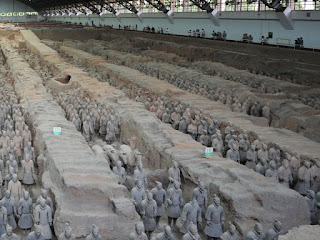Paul and I met to read the last part of Mark's gospel. We began at the beginning of chapter 15 and read section by section right through to the end. Here are some of the things that stood out for me.
 As far as we know the religious authorities handed Jesus over to Pilate because they were not permitted to apply the death penalty themselves. The Romans had decreed that only they could execute a prisoner.
As far as we know the religious authorities handed Jesus over to Pilate because they were not permitted to apply the death penalty themselves. The Romans had decreed that only they could execute a prisoner.The charge against Jesus was blasphemy and the penalty would have been stoning to death. Stonings were still comtemplated, even carried out (eg Stephen, the woman caught in adultery) but were presumably unofficial, illegal, and overlooked.
The Sanhedrin could hardly issue an illegal order right under the nose of the prefect. So they went to Pilate with a range of accusations, none of which they could prove. They knew a Jewish religious offence would not impress Pilate, so they chose something more promising - that Jesus claimed to be a king and was therefore a political challenge to Pilate, Herod, or even the Emperor in Rome. Pilate still didn't buy it, but sent Jesus for crucifixion to satisfy the mob.
It is striking that Simon, a passer-by, was forced to carry the cross. The presumption is that Jesus, weakened by injuries sustained from his earlier flogging, was either unable to carry it or perhaps collapsed after part of the journey.
Jesus refused to take the painkilling myrrh mixture in wine. They crucified him and then cast lots for his clothes. We decided he would have had a loin cloth, a tunic (rather like a T-shirt), a cloak, belt and sandals. The soldiers were not wealthy, clothing would have been expensive, so wasting it was unthinkable.
It's also interesting that the sign on the cross read 'King of the Jews'. Pilate ordered it written in three languages, he was making it clear one last time that in his view Jesus had committed no recognised crime. Those crucified with him would have been labelled 'Murderer, criminal, rebel' or something similar.
We also discussed the Aramaic words that Jesus shouted out. 'Eloi' is closely related to the Arabic word 'Allah' and the Hebrew 'Eloh' (plural 'Elohim') and simply means 'Mighty One' or 'Almighty'. The onlookers thought he said 'Elijah' which would have sounded like 'Ell-ee-yah' or 'Ell-yah' and means 'Mighty Yah' or in full 'Yahweh the Mighty One'. (See also an earlier post.)
I had a photo from Jerusalem of a similar tomb to the one Joseph of Arimathea would have used and we looked at it (see above). It seems Jesus had a few followers in the Sanhedrin itself, Joseph was clearly one of these and bravely did what he could to help.
We covered more than these few items of course, but these are the things I feel I should mention in this post.
Next time we meet we have decided to begin the book of Acts.
< 12th December 2011 | Index | 11th January 2012 >






